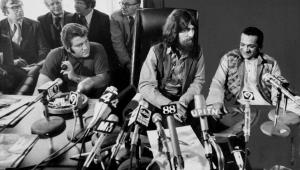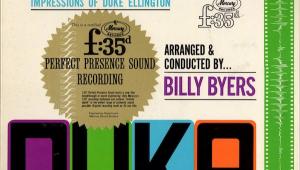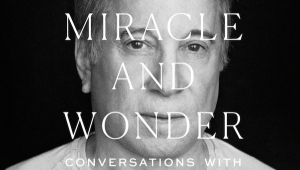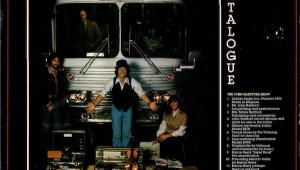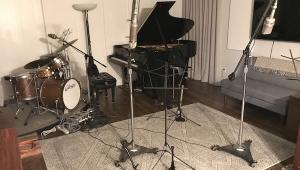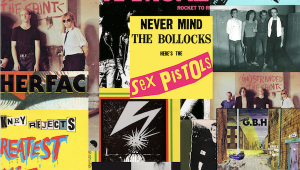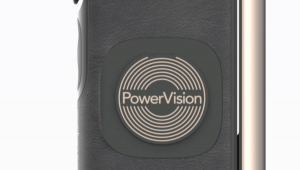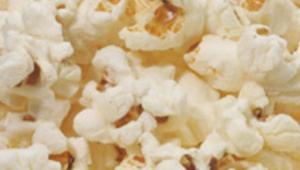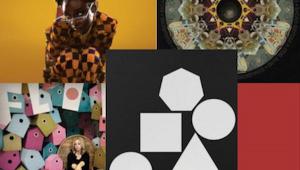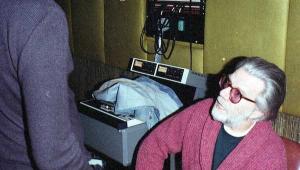The Records You Didn’t Know You Needed---#1: Chet Baker—My Funny Valentine---(Circle 23581 26)
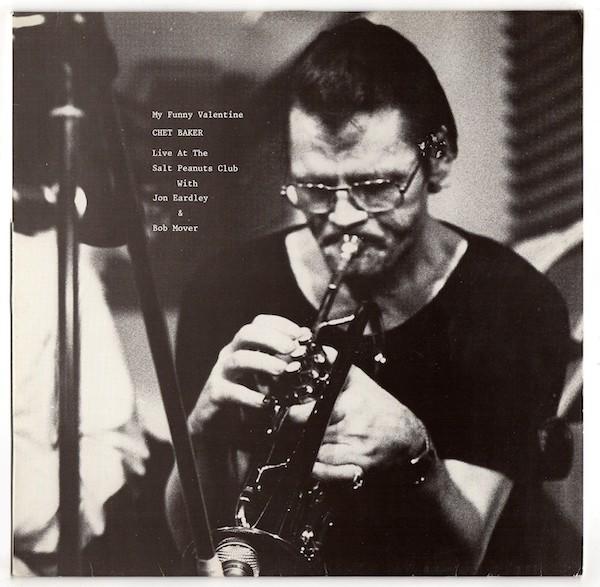
It hadn’t been a downward spiral so much as a terminal velocity plummet—heroin overdoses, dope sickness, crimes both petty and major, arrests, jail time, deal gone bad beatings, lack of dependability leading to lack of employability, and a reputation lower than his bank balance, all culminating in his front teeth being knocked out, destroying his embouchure. After a stint on welfare, he began playing again in 1973, but his style was unfashionable in the U.S. and work was not plentiful for a 50s cool jazz relic in the time of fusion and “Afro-Spiritual” jazz. But Europe took him in as it had so many jazzmen in need.
Baker relocated there in 1975, only rarely returning to the U.S. European drug laws were less punitive and enforcement less strict. He worked regularly, though in Baker’s words, “I work for a lot less than some people, but then I work a lot more.” In Europe, Baker became the archetypal roving jazz soloist—playing anywhere, playing with anyone good, bad or indifferent, playing his music, getting paid in cash, then crashing, getting high, and on to the next gig. He did this for more than a decade. He found the best dope dealers and he found the best musicians. His money went to the dope dealers and was gone and his music, when he wasn’t “sick” and he was that ever so precariously balanced “right,” was beautiful, for he was playing better than ever and it went into the air in the moment and was gone, just before the clapping started in the clubs and bars.Some have said Baker’s life was tragic and sad. Chet himself said, “I don’t know why anyone should think I’m particularly unhappy: I’m doing what I like to do and I always have.” Then he was gone, out a second story window in a dope related mysterious misadventure. No regrets.
Baker made approximately one hundred recordings while he lived in Europe. There was always someone to offer a recording deal and Chet was always in a panic. Small, independent jazz labels run by fans couldn’t offer promotion, distribution networks, recording budgets, expensive sidemen, or much except a modest advance against royalties, but the deals weren’t exclusive and there was sure to be another label that would want a record by the legendary Chet Baker in their catalogue. Most of them were low cost, quick, easy buck for Chet, live recordings that repeated the same dozen or so tunes in different combinations and paired him with musicians that were much younger and well below his talent level. Even the most run of the mill of these “Where’s the money? OK. Where do I sign” recordings have some moments of “lifting the band” brilliance from Baker, but he never really played his very best unless there was a musician, he considered a peer present to inspire him.
Fortunately for us, on May 21-25, 1981, Baker played at the Salt Peanuts club in Cologne Germany in a quintet with a peer, the trumpeter/flugelhornist Jon Eardley, and three LPs resulted. Eardley (1928-1991), was a little over a year older than Baker and like him was an expatriate American and a former member of Gerry Mulligan’s group. In the 50s, Eardley had recorded with Phil Woods and had made three LPs of his own for Prestige; two ten-inch and one twelve-inch, before relocating to Belgium in 1963 to play in studio orchestras. He was an accomplished jazz soloist, a consummate musician and someone Baker had to respect. Also, on the gig, was American alto and soprano saxophonist, Bob Mover (b. 1952), whose more modern style, an unusual combination of Sonny Rollins and Lee Konitz influences, served as an apt foil for the older men. The unusual drummer-less quintet was filled out by pianist Dennis Luxion (b.1952), a talented and underappreciated American pianist who worked frequently with Baker and German bassist Rocky Knauer (b.1951).
The music is loose and informal, typical Chet club fare with a few minor flubs here and there. “Resonant Emotions,” an infrequently played Jimmy Heath composed boppish blues, is played at the relaxed medium swing tempo that Baker was most comfortable in. Eardley has the first solo and plays some beautiful long-lined melodic phrases with the easy swing and command of a master, ending with some unexpected high notes. It is unfortunate that such a fine musician didn’t record more. Mover, up next, with his very different, more modern, aggressive style, plays more notes and is less melodic with a few Ornette-like cries. Baker follows with a brilliant solo that is one long flowing melodic phrase until the end when he plays a circular, repetitive run of eighth notes, probably glancing over at Mover and Eardley to make sure they noticed that he could play all that tricky stuff too. “Ray’s Idea,” a bop standard tune with expanded blues changes that Baker played frequently, is more bop played his way. Once again, the tempo is just a bit faster than medium. The horns play the melody with a nice blend and Mover takes a long solo, displaying considerable technique and Lee Konitz-like harmonic complexity. Eardley plays a long solo too, displaying his full sound, playing long lines through the chords with rhythmic urgency. Baker’s solo is the shortest but with all the intensity and compression of a haiku. He slows the tempo and makes masterful use of space as he takes time to find and then play melody rather than “running through the chords.” It’s a fragile and poignant trip into the sadness of Chet.
“My Funny Valentine” is Chet’s “greatest hit” and the only vocal on the LP. He sings in his usual expressionless croon/drone, his intonation is very poor, and he doesn’t even try to sing the high notes. But that’s Chet’s style and somehow, it’s always curiously and sometimes deeply affecting. He is jazz’s great minimalist singer, eschewing technique, emotion, or even communication, seeming to be a man completely alone and incapable of feeling anything, but singing a romantic love ballad as best he can to remind himself of the emotions that he once felt. The LP ends with “If I Should Lose You,” a beautiful tune usually done as a ballad, but here done very fast at cutting contest speed. Mover and Eardley can be heard gasping and groaning as they play complex, hard-swinging solos that blaze through the chord changes. Chet doesn’t even try to keep up but seems to say “O.K., you guys win.” and begins tentatively and quietly, playing a little melodic fragment that he expands into a glorious, improvised continuous melody for chorus after chorus with some beautiful rhythmic figures and even some high notes. It’s pure music and only Chet could have played it.
The recording quality is “front table in the club” exceptional. The horns are 3D palpable with all the overtones suspended above them in the air and mixing when they play together into a cloud of sound. Soundstaging is pinpoint and you can “see” the horns as they move around the mikes. The unamplified bass is not super deep and a little distant, but that’s the way it would sound in a club. The piano is an upright and sounds thin but it’s not too badly out of tune. This is one of the finest, most honest recordings of jazz in a club that I have heard and is as close as we will get in 2020 to hearing Chet Baker playing a club gig. Three LPs were issued from the group’s run at the Salt Peanuts club. The other two, I Remember You and ‘Round Midnight are also very good musically and similar sonically. None of them have ever been reissued on LP or CD.
Circle was a label based in West Germany that put together a very nice catalogue of about forty jazz LPs, mostly recorded live, ranging from Chet to Sam Rivers with little or no filler. Recording quality was uniformly good and frequently much better, with excellent pressings but basic and sometimes odd artwork. They issued nine live LPs of Baker and they make a superb documentation of Chet in Europe; playing the music in the moment, then done and on to the next gig.
“I play every set as if it were the final one. It has been like this for years. I don’t have much time left, and it’s important to show the musicians I’m playing with more than anybody else, that I give everything I’ve got in me, and that I expect them to do the same. Music comes from within, and it happens thanks to the musicians I’m playing with. I love to play, and I think that’s the only reason I’ve been brought into the world.”
No regrets. None.






